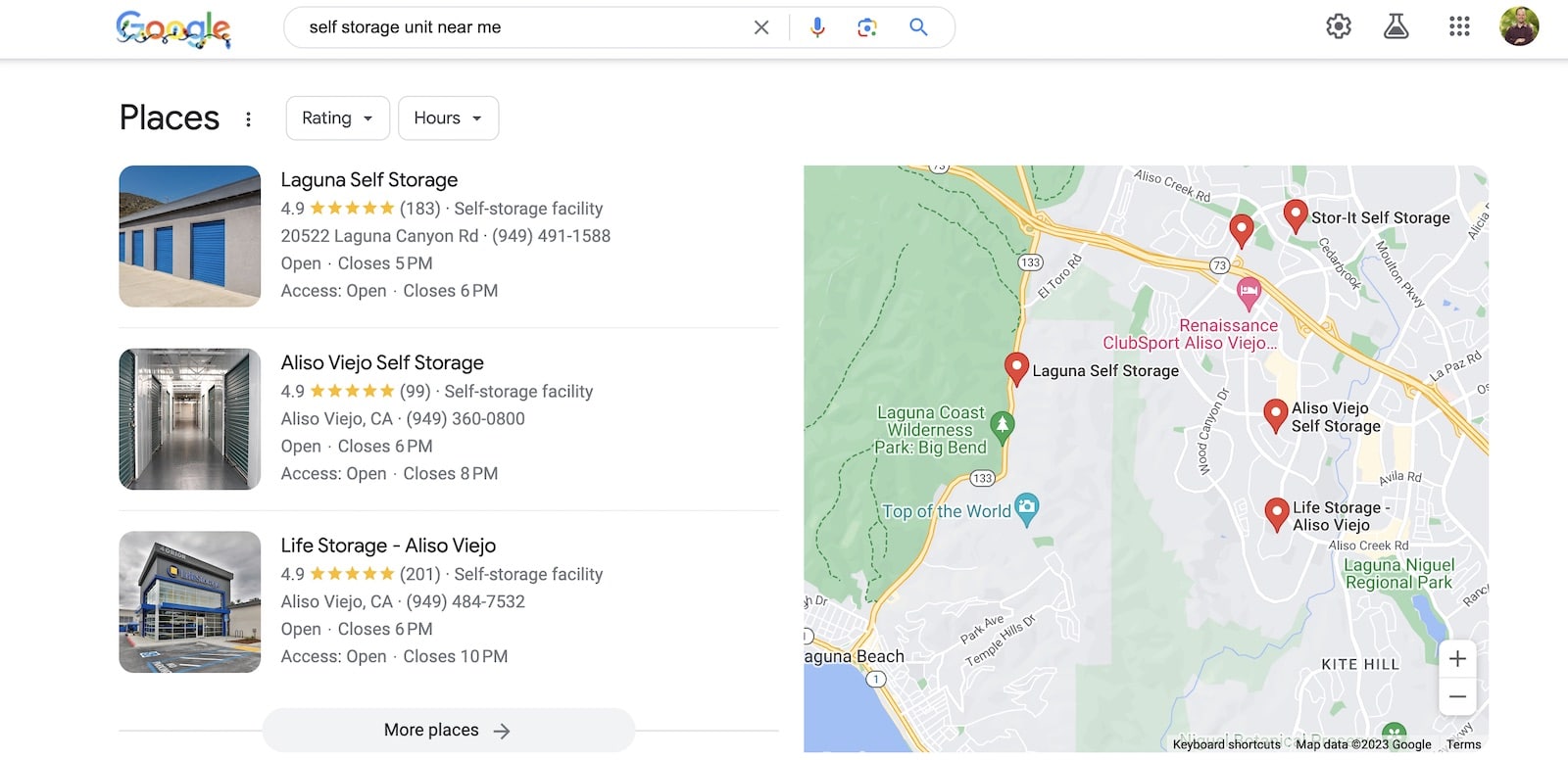Local SEO for Self Storage: You Gotta Do It

There are certain things your self storage facility needs: signage, lighting, an electric gate, ADA access and so on. And there are certain costs you build into your budget, including labor, maintenance, bills, a phone number and more. On the digital side, you also have certain essentials with associated costs: property management software, a domain name, website hosting, email addresses, etc.
Managed Local SEO (Search Engine Optimization) is one of those digital essentials. You just gotta do it as a cost of doing business.
And like changing the oil on your truck, you can learn to do Local SEO yourself, with all the mess and cost that comes with it, or you can work with someone that handles it all for you for a reasonable fee.
So what is Local SEO and why is it a must-do?
Local SEO for self-storage facilities refers to the process of optimizing online content and data with the intent of improving visibility in local search results, and more recently, AI engine results. The primary goal is to attract potential customers within a specific geographic area who have "search intent," where they are actively searching for a storage unit. You want to get in front of that searcher looking for "storage unit near me."
What does this mean in layman's terms? When someone searches for "storage units near me," you want your facility to show up in search results, particularly the Local Pack (example below) and on Google Maps.

Local SEO, then, is managing a number of things that can affect your facility's position in the search results. Actively managing this (or entrusting an agency to do so on your behalf) can serve as a competitive differentiator.
What are the key elements of Local SEO?
Key elements of Local SEO for self-storage facilities include:
- Google Business Profile (GBP) Optimization (formerly Google My Business)
- Local Citations, aka Business Listings
- Customer Reviews and Ratings
- On-Page Optimization
- Local Link Building
- Mobile Optimization
Local SEO is not sexy, nor is it particularly fun to deal with. Sort of like changing your own oil, unless you're in to that sort of thing. But its a must-do for any business with a local service area, be it a self storage facility or a dentist or a plumber or a restaurant.
And with AI here, the importance of it is only increasing.
In a nutshell, why is Local SEO so essential?
Google has become increasingly data-driven in how it ingests data and uses that data to populate search results.
And there's a ton of data about your facility online. This starts the moment you register a business with the Secretary of State, and that information is posted on the SoS website.
That data starts spreading across many websites and directories, many of which have their own spiders or web crawlers. It isn't just Google that crawls the web - Yelp and Bing and Apple Maps and others do too!
So picture this - a bunch of websites are crawling other websites looking for business data. Bad data can take root, and it can be self-reinforcing across all of these websites. It also produces inconsistent data from site to site. Google really doesn't love inconsistent data and it can negatively affect search results.
Local SEO and rebranding
Compounding this dramatically is the process of rebranding a storage facility. What was Greta's Storage is now Shiny Storage, but Greta still has a big "web footprint" out there, with business listings populating dozens or hundreds of websites.
As you can imagine, Google can get confused about what business is at what address. Which "signals" should Google pay attention to and trust - those for Greta or those for Shiny? Even as you create business listings for Shiny, you're still struggling with those now-outdated Greta listings.
Your (biggest) competitors are doing it!
We're all looking for competitive differentiators. From signage to promotions to free coffee in the office, we all want to stand out and leave a warm and fuzzy feeling with our prospects and customers alike.
If your storage facility is in a competitive market, your biggest competitors all have Local SEO practices in place, from well-optimized websites to active licenses with enterprise platforms. Extra Space Storage, Public Storage and National Storage are all doing it, while your small local mom-and-pops with one or two facilities in a market are most likely NOT doing it.
This poses the question: WHY do the big REITs pony up for Local SEO services? Because they know that maintaining clean, consistent data across the web is really important, and can be a competitive differentiator.
Local SEO, then, becomes an affordable baseline marketing expense that can give you an edge over your local competitors and give you a shot at competing against the big guys who can dominate local search results.
Local SEO and the Source of Truth
The solution to all of this confusing data floating around is to establish yourself (or entrust a company like ours) as the Source of Truth.
In other words, you can allow Google, Yelp, Yahoo and all the rest to crawl the web and try to get it right OR you can actively manage Local SEO, where you're able to tell all these sites that you're the business owner and that the data you're sending out is clean, vetted and can be trusted over all other sources of data (including some random on Facebook who decides to change your business hours!).
OK, I need Local SEO for my storage facility, now what?
If you are going to DIY, you'll first need to learn how it all works. Plan on reading a LOT, prioritizing recent articles given how much and how quickly things change (our parent agency has a Local SEO guide here). You'll then need to purchase a couple enterprise platform licenses for about $80-$100 a month per location and allocate about an hour a week.
Or sign up and we'll take care of everything for under 200 bucks a month.
Local SEO is defensive
What happens if you stop managing Local SEO?
Assuming you've been doing it right, you've been communicating with dozens of sites as the Source of Truth. When you detach the enterprise licenses that enable this, all those sites no longer have that Source of Truth.
So typically, within days or weeks or, at most, months, your business listings start changing, because all those website crawlers resume looking to other websites for signals and confirmation about your business. And it's very common that incorrect data can propagate as a result.
Some shifts we've seen in short order after detaching:
- Google arbitrarily changing multi-facility location names i.e. Shiny Storage of Toledo → Shiny Storage
- Google confusing multiple locations in the same town, which Google may interpret as duplicate listings
- Phone numbers reverting to old versions or Google Voice numbers
- Hours of operation and gate hours changing
Thus managed Local SEO is defensive, ensuring that you're on top of something that otherwise can become a pain point that can be difficult to solve when your local presence is un-managed. Thus, the reality is that you just gotta do it - put it in the budget and DIY or find good help.
It is in your budget
Who's been handling this for your website? You do have a line item for marketing in your budget, right? Local SEO is your baseline marketing spend, whether you're at CofO, or filling up an expansion or fully stabilized. And whether you DIY or work with an agency, you'll be ensuring that Google is getting the right data for your facility.
In skilled hands, managed Local SEO works. As the Source of Truth, you'll have clean, consistent data pushed out to key websites and directories, you'll send the right signals to Google and as a result, your facility will be well-positioned to rank well in search results. It's not a silver bullet where you will suddenly outrank Extra Space and Public Storage, but it's one of the few ways you can compete against the big guys and outrank similar competitors.
We've got you covered
We're high-touch, high-communication and proactive in how we manage Local SEO. We don't see it as a commodity like so many of our competitors. We post weekly Google Business Profile posts, we reach out frequently with Google Suggestions, and we let you know when you've missed a Review. As the Source of Truth, we'll make sure your online search presence is in good hands.
We know that self storage facility owners really don't like spending money. We know that any costs affect your NOI and thus your valuation. So if there's something you simply gotta do for your facility, and you've entrusted us, we're going to do right by you and work hard to earn your confidence every single day. If it sounds like we might be a good fit, get in touch, let's connect, and we'll hit the ground running.
Panda Image created in DALL-E 3. AI ain't perfect, folks, it's kinda weird!
LAST UPDATED: November 26, 2025
